Bringing home a tabby Maine Coon cat is an unforgettable experience, especially for first-time owners captivated by their gentle giant personalities and stunning coat patterns. These large, affectionate felines, often called “gentle giants,” combine impressive size with playful quirks that make them ideal companions. If you’re considering a tabby Maine Coon or already sharing your home with one, understanding their unique tabby patterns, color variations, and care needs is key to ensuring their health and happiness.
In this comprehensive guide, we’ll explore everything from the genetics behind tabby markings to practical tips for grooming and nutrition. Whether you’re drawn to the classic brown tabby or the rare Blue Tabby Maine Coon, you’ll gain expert insights to help your cat thrive. For more on fancy cat breeds like the purebred bengal cat, check out our related articles.
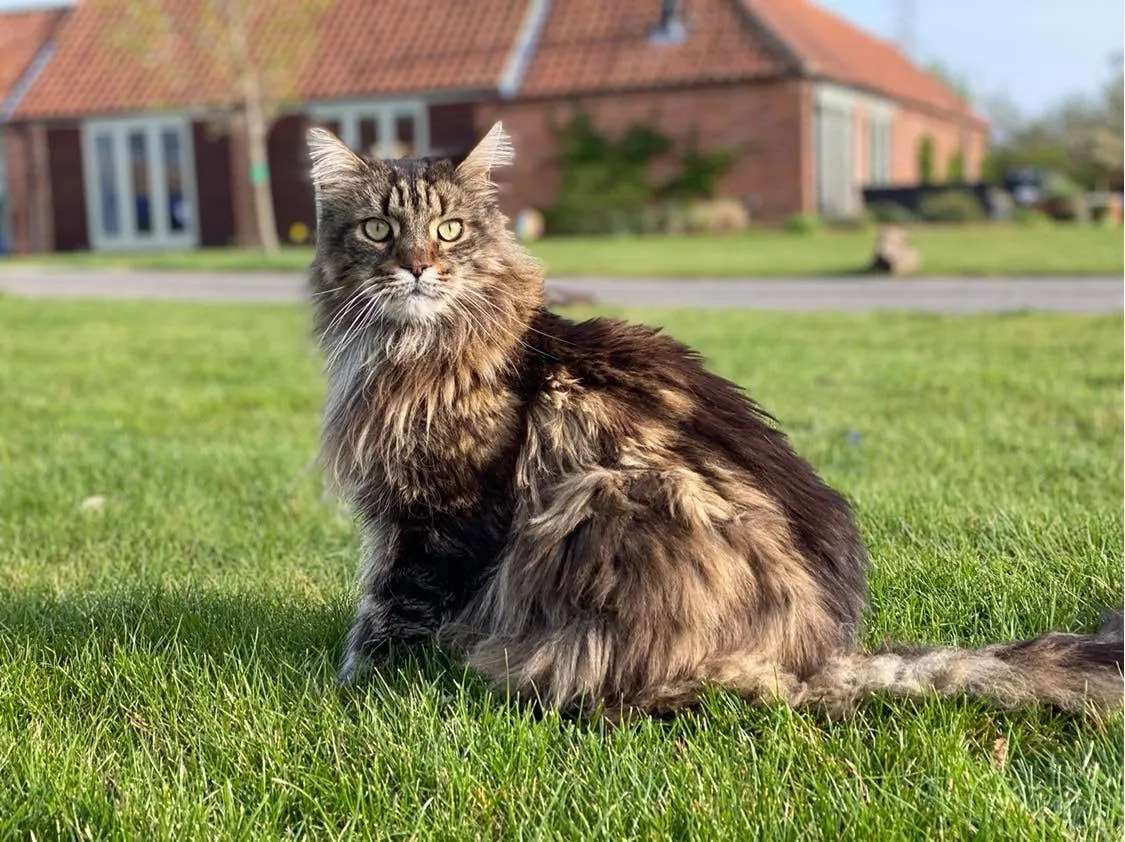 Pippin the Maine Coon cat sitting outside our home, in the garden.
Pippin the Maine Coon cat sitting outside our home, in the garden.
What Is a Tabby Pattern in Maine Coon Cats?
The tabby pattern refers to the distinctive striped, swirled, or spotted designs on a cat’s fur, a genetic trait common across many breeds, including the majestic Maine Coon. Unlike solid colors, tabby coats feature bold markings that enhance their wild, elegant look. According to the Cat Fanciers’ Association (CFA), tabby patterns stem from specific genes that create these eye-catching variations.
Major cat registries like CFA and The International Cat Association (TICA) recognize three primary tabby patterns: classic, mackerel, and ticked. However, TICA also acknowledges a fourth—spotted—as a modifier that breaks up stripes into spots, particularly visible on the sides, shoulders, and legs. This slight discrepancy highlights ongoing discussions in feline genetics, but all patterns add to the tabby Maine Coon’s allure.
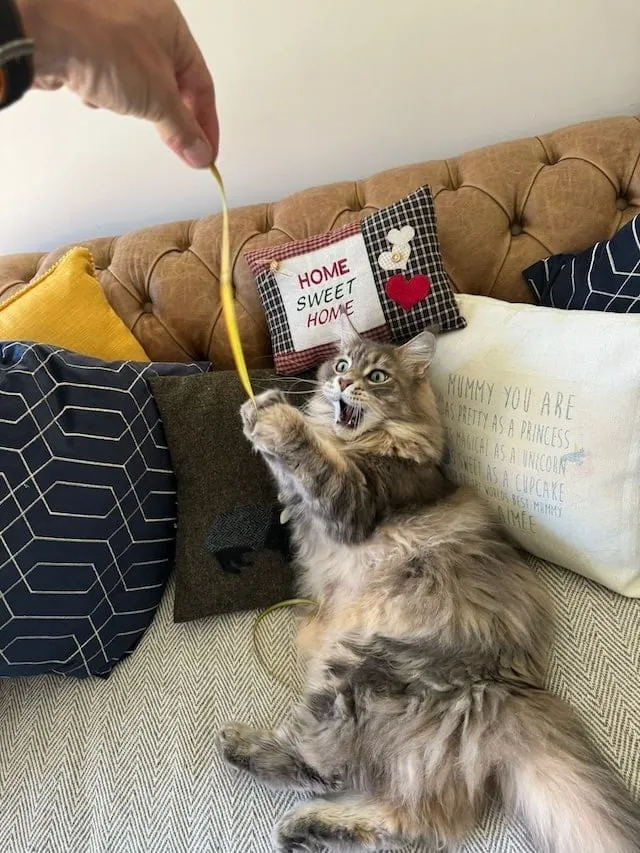 Mika the Maine Coon cat catching a leaf, whilst laying down and with his mouth open
Mika the Maine Coon cat catching a leaf, whilst laying down and with his mouth open
Types of Tabby Patterns in Maine Coons
Tabby Maine Coons display a range of patterns, each with unique characteristics that accentuate their large, muscular builds and tufted ears.
Classic (Blotched) Tabby
The classic tabby features bold, swirling lines forming a “bullseye” or target on the sides, resembling marble or butterfly wings. These thick, whorled markings create a dramatic, traditional tabby appearance that’s highly prized. In Maine Coons, this pattern stands out against their shaggy, medium-long fur, making grooming essential to highlight the details.
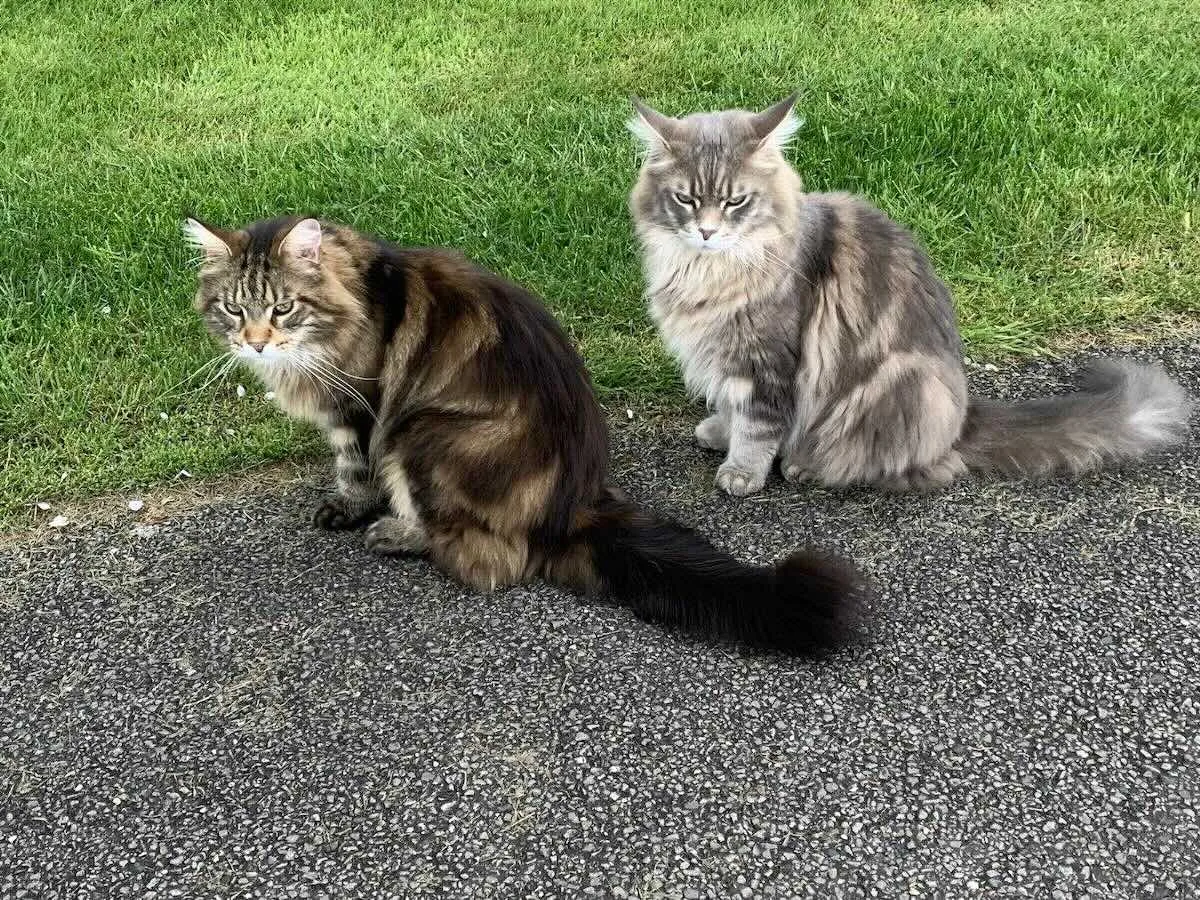 Two Maine Coon cats sat next to each other
Two Maine Coon cats sat next to each other
Mackerel Tabby
Known as the “tiger-striped” pattern, mackerel tabbies have narrow, parallel stripes running vertically from a dark spinal line. This sleek design mimics a fishbone, giving the cat a streamlined, elegant vibe. It’s the most common tabby pattern and suits the Maine Coon’s active, dog-like behavior perfectly.
 Pippin the Maine Coon cat sitting outside our home, in the garden.
Pippin the Maine Coon cat sitting outside our home, in the garden.
Spotted Tabby
Spotted tabbies break stripes into distinct spots or rosettes, evoking a wild leopard-like coat. These vary in size and shape, often on the body sides and legs. Less common in Maine Coons, this pattern adds a playful, exotic flair that’s sure to turn heads.
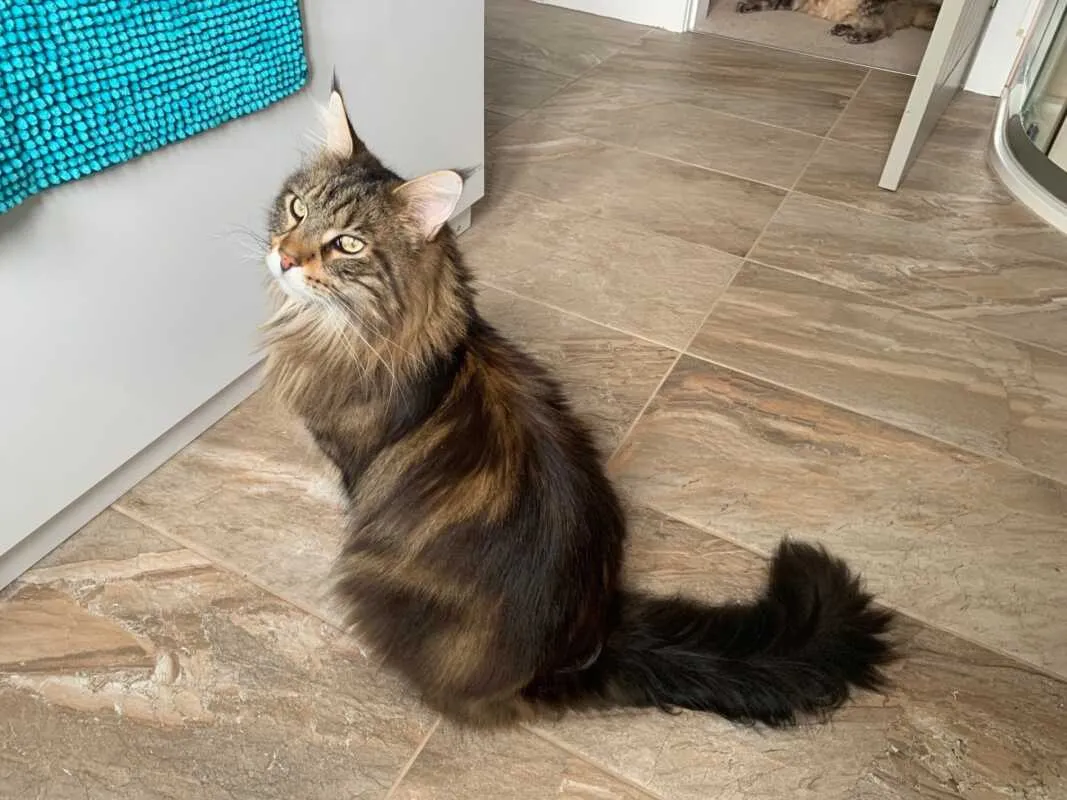 Bali our tabby Maine Coon cat sat next to the bath
Bali our tabby Maine Coon cat sat next to the bath
Ticked Tabby
The subtlest pattern, ticked tabbies have banded hairs alternating light and dark colors, creating a speckled, even-toned coat without bold stripes. This refined look appears in breeds like Abyssinians but occasionally in Maine Coons, offering an understated elegance.
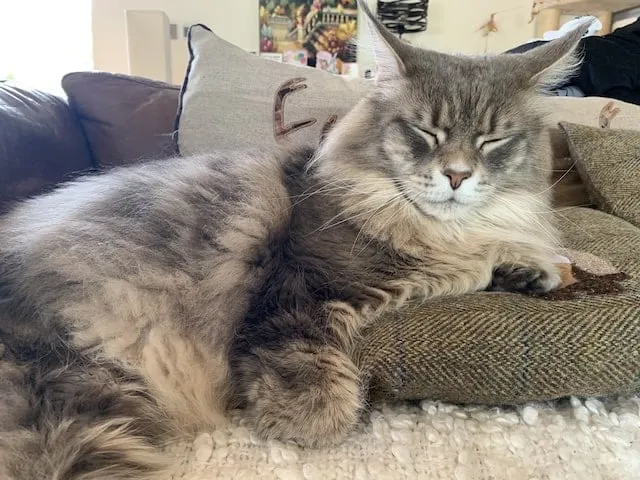 Mika a blue tabby Maine Coon cat sleeping on the sofa
Mika a blue tabby Maine Coon cat sleeping on the sofa
Tabby Maine Coon Color Variations
Tabby patterns pair with various colors, each enhancing the Maine Coon’s signature look. The CFA recognizes five main tabby Maine Coon colors.
Brown Tabby
The original Maine Coon color, brown tabby blends warm browns, blacks, and subtle reds for an earthy vibe. Common and easy to breed, they’re often mistaken for mixed breeds but carry the breed’s loyal, friendly traits.
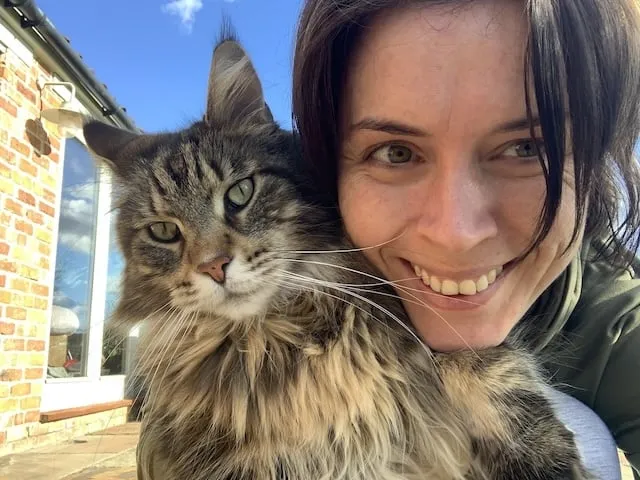 Bali the Maine Coon cat and Katrina Stewardson. Female holding big cat!
Bali the Maine Coon cat and Katrina Stewardson. Female holding big cat!
Silver Tabby
Silver tabbies dazzle with black-on-silver contrast, creating a shimmering, ethereal coat. Their cool tones and sharp markings exude sophistication.
For enthusiasts of all kinds of cats, silver tabbies stand out among fancy cat breeds.
Red (Orange) Tabby
Vibrant oranges and reds make this bold pattern eye-catching, though rarer in Maine Coons. It adds fiery energy to their gentle demeanor.
Blue Tabby
A grayish-blue hue gives blue tabbies rarity and elegance. Often confused with gray (not an official color), they require careful identification.
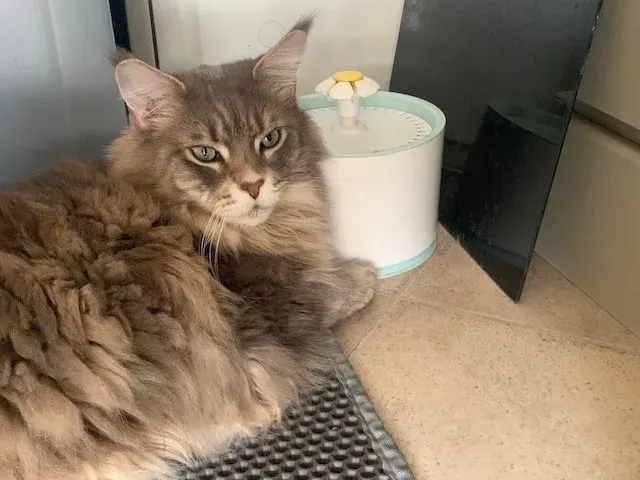 Mika the Maine Coon cat sat next to his pet water fountain
Mika the Maine Coon cat sat next to his pet water fountain
Cream Tabby
This soft, pastel version of red tabby offers a gentle, refined alternative, perfect for understated beauty.
Explore more on unique varieties like the khao manee cat price or most rare cat breeds.
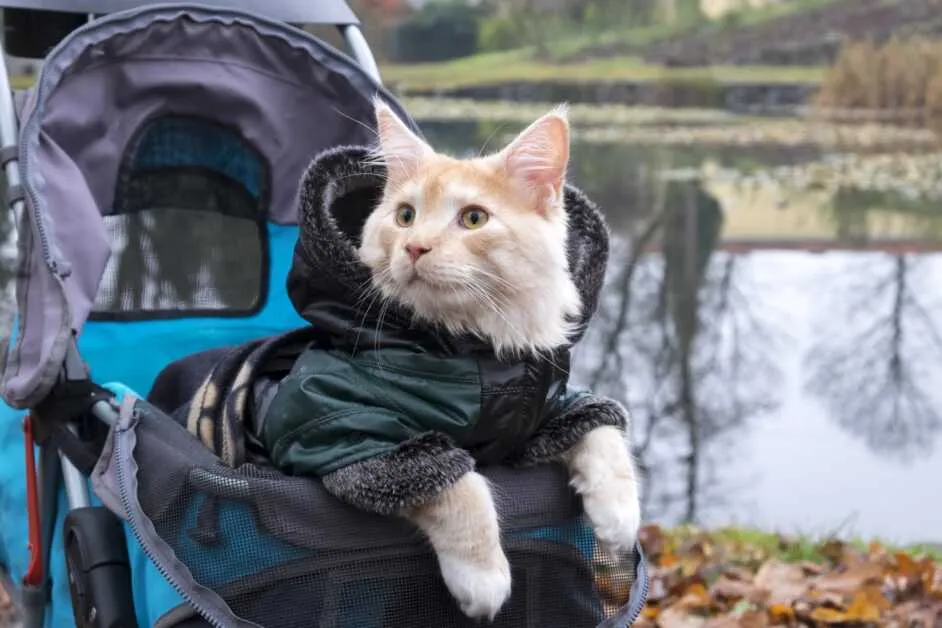 Best tips for traveling with a Maine Coon cat
Best tips for traveling with a Maine Coon cat
Identifying a Tabby Maine Coon Kitten or Adult
Beyond patterns, spot a tabby Maine Coon by their tufted ears, bushy tails, and robust frames. Behaviorally, they’re friendly, loyal, and dog-like—curious explorers who bond deeply with families. The signature “M” marking on the forehead, darker in tabbies, confirms purebred status.
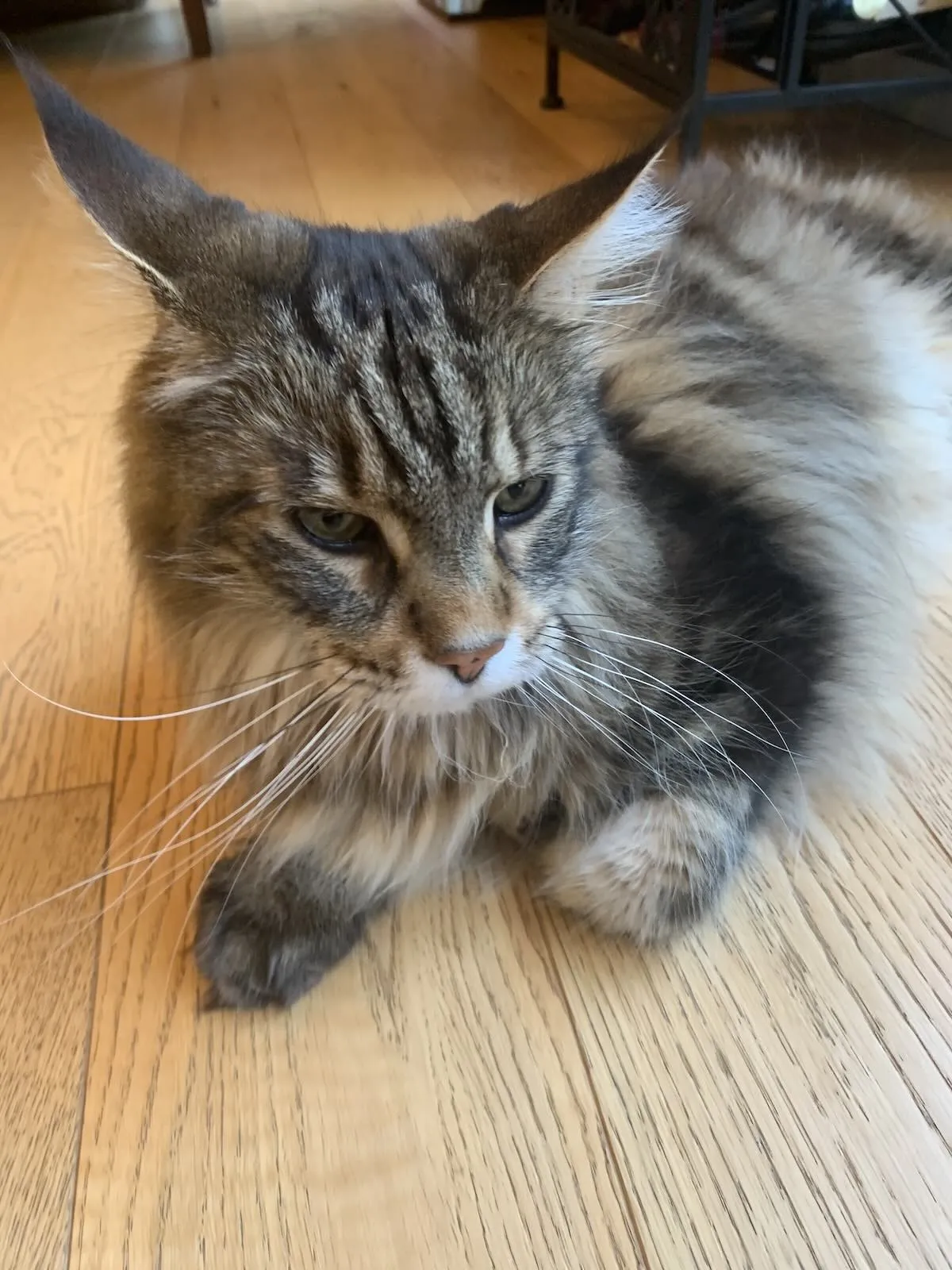 Close-up picture of Maine Coon cat
Close-up picture of Maine Coon cat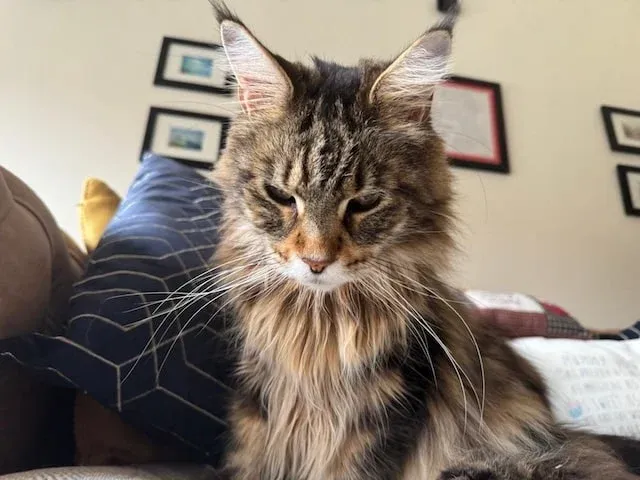 Bali looking downwards with huge whiskers
Bali looking downwards with huge whiskers
Essential Care for Tabby Maine Coon Cats
Grooming Needs
Their thick, water-resistant fur demands brushing 3-4 times weekly to prevent mats and reduce shedding. This keeps tabby patterns vibrant and supports skin health, per veterinary recommendations.
Nutrition and Diet
High-protein diets with quality kibble and wet food maintain coat shine and muscle mass. Avoid overfeeding to prevent obesity, consulting vets for breed-specific formulas.
Health Monitoring
Prone to hip dysplasia and hypertrophic cardiomyopathy (HCM), tabby Maine Coons need annual check-ups, genetic screening from breeders, and active play to stay fit.
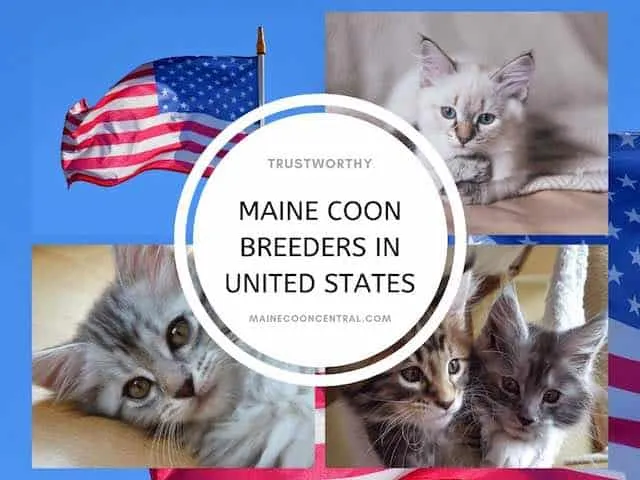 Maine Coon Cat Breeders In United States, By State
Maine Coon Cat Breeders In United States, By State
How to Get a Tabby Maine Coon
Reputable TICA/CFA breeders ensure health-tested kittens with desired patterns. Ask about pedigrees and visits. Shelters often have mixes or purebreds, offering second chances.
Conclusion
Tabby Maine Coon cats blend stunning patterns—from classic swirls to ticked subtlety—with colors like brown, silver, and blue, making them irresistible pets. With dedicated grooming, balanced nutrition, and vet care, they live long, joyful lives as loyal family members. Consult a veterinarian for personalized advice, and explore our guides for more cat care tips.
References
- Cat Fanciers’ Association (CFA): Maine Coon Standard
- The International Cat Association (TICA): Tabby Pattern Guidelines
- Maine Coon-specific health studies from veterinary sources like Cornell Feline Health Center
